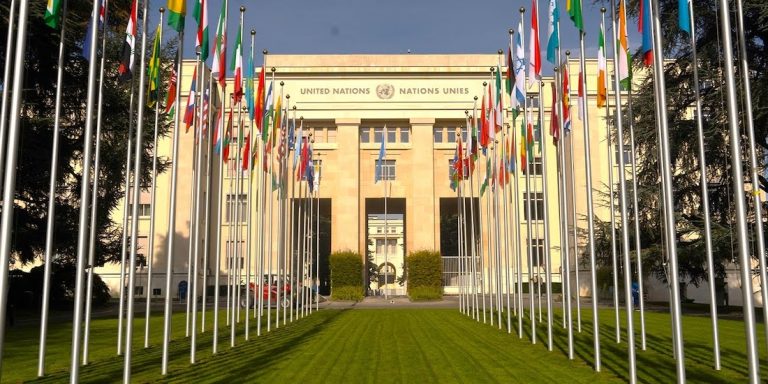
Beijing-Backed Groups Flood U.N. with Pro-China Narratives
Geneva — Dozens of self-described nongovernmental organizations (NGOs) active at the United Nations in Geneva have hidden ties to the Chinese government, working to subvert the U.N. Human Rights Council by flooding sessions with pro-China narratives, according to an investigation by The Washington Post and the International Consortium of Investigative Journalists (ICIJ).
These Beijing-backed groups present glowing accounts of China’s human rights
record, often contradicting credible reports of repression, creating a challenging
environment for legitimate NGOs advocating for persecuted populations.
The investigation, based on interviews and public records, highlights a concerted effort by Beijing to influence U.N. proceedings at the Palais Wilson and Palais des Nations, the headquarters of the U.N.’s top human rights bodies.

Since 2018, the number of Chinese organizations with U.N. credentials has nearly doubled, with many gaining accreditation after a 2018 U.N. report raised alarms about the detention of over a million Uyghurs in Xinjiang. The surge aligns with Chinese President Xi Jinping’s push to expand China’s global influence, with the Ministry of Foreign Affairs in 2020 stating it “vigorously supported and guided domestic NGOs to ‘go global.’”
These groups, often referred to as government-organized NGOs (GONGOs), participate heavily in Human Rights Council sessions. In 2024 alone, 33 Chinese NGOs made nearly 300 appearances, delivering statements that consistently praise China’s policies without criticism, according to data from the International Service for Human Rights (ISHR).
Their delegates often disrupt or drown out testimony from organizations like
Amnesty International and Human Rights Watch, which document abuses
such as the internment of Uyghurs, forced separation of Tibetan children,
and crackdowns on Hong Kong democracy activists.
“The U.N. is one of the only forums where we can raise our cause,” said Zumretay Arkin, vice president of the World Uyghur Congress, in an interview. “It’s become one of the places where these governments carry out their repression.” Arkin described a hostile environment in Geneva, where NGO officials report being monitored and threatened, with some activists avoiding U.N. premises due to fears of retribution against their families in China or Hong Kong, especially after the 2020 National Security Law criminalized “colluding with foreign forces.”
The investigation points to a broader strategy by Beijing to counter scrutiny of its human rights record.
Chinese GONGOs often align with the Like-Minded Group, a coalition of primarily authoritarian states that resist country-specific human rights resolutions. This group, including nations like Russia and Cuba, fills speakers’ lists with supportive statements during China’s Universal Periodic Reviews, diluting critical voices. In 2019, during China’s review, six of the ten NGOs allowed to speak were GONGOs, according to ISHR.
The case of Cao Shunli, a Chinese human rights defender detained in 2013 while traveling to Geneva and later dying in custody, underscores the risks for critics. In March 2024, over 30 organizations called for accountability for her death, a demand echoed by nine European human rights ambassadors. Despite such calls, Beijing denies intimidation, with embassy spokesperson Liu Pengyu asserting China’s “people-centered approach” has expanded education, healthcare, and poverty alleviation, contributing “constructively to global human rights governance.”
The U.N. Human Rights Office acknowledges the challenge but says distinguishing between “authentic” and “non-authentic” NGOs is unworkable and risks abuse. Kenneth Roth, former Human Rights Watch director, told ICIJ that China’s efforts to deter condemnation, particularly of Uyghur detentions, threaten the global human rights system.
“Beijing has proposed to rewrite international human rights law,” he said, noting restrictions on independent experts’ access to China and efforts to block exiled critics in Geneva.
The proliferation of Beijing-linked NGOs has drawn concern from diplomats and activists.
In 2023, Reuters reported China lobbied non-Western countries to praise its human rights record ahead of its Universal Periodic Review, a tactic critics say exploits economic ties through initiatives like the Belt and Road. While some developing nations align with Beijing, others, including progressive Latin American governments, face pressure to address China’s influence in multilateral forums.
As the U.N. Human Rights Council continues its work, the growing presence of Beijing-backed NGOs raises questions about the integrity of global human rights advocacy. For now, Geneva remains a battleground where legitimate NGOs struggle to amplify the voices of the persecuted against a tide of state-backed narratives.
Sources: The Washington Post, International Consortium of Investigative Journalists, International Service for Human Rights, Reuters, Human Rights Watch.